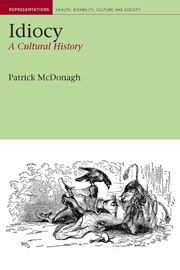Book contents
- Frontmatter
- Contents
- Preface and acknowledgements
- 1 Introduction: idiocy, culture and human relations
- 2 ‘Stripping our own hearts naked’: William Wordsworth and John Wilson read ‘The Idiot Boy’
- 3 A ‘pupil of innocent Nature!’ The wild boy of Aveyron goes to Paris
- 4 Diminished men: masculinity and idiocy
- 5 Essential women: femininity and idiocy
- 6 Holy fools, witty fools, depraved fools: folly, innocence and sin
- 7 History, society, economy: holy fools and idiots come home in nineteenth-century literature
- 8 Barnaby Rudge, idiocy and paternalism: assisting the ‘poor idiot’
- 9 Innocence, philanthropy and economics: the new ‘asylum’ idiot
- 10 Sensational idiocy
- 11 ‘The sins of the fathers’: idiocy, evolution and degeneration
- 12 Danger and degeneracy: the threat of the urban idiot
- 13 The problem of the feeble-minded: the Royal Commission, eugenics and eternal chaos
- Epilogue
- Bibliography
- Index
13 - The problem of the feeble-minded: the Royal Commission, eugenics and eternal chaos
- Frontmatter
- Contents
- Preface and acknowledgements
- 1 Introduction: idiocy, culture and human relations
- 2 ‘Stripping our own hearts naked’: William Wordsworth and John Wilson read ‘The Idiot Boy’
- 3 A ‘pupil of innocent Nature!’ The wild boy of Aveyron goes to Paris
- 4 Diminished men: masculinity and idiocy
- 5 Essential women: femininity and idiocy
- 6 Holy fools, witty fools, depraved fools: folly, innocence and sin
- 7 History, society, economy: holy fools and idiots come home in nineteenth-century literature
- 8 Barnaby Rudge, idiocy and paternalism: assisting the ‘poor idiot’
- 9 Innocence, philanthropy and economics: the new ‘asylum’ idiot
- 10 Sensational idiocy
- 11 ‘The sins of the fathers’: idiocy, evolution and degeneration
- 12 Danger and degeneracy: the threat of the urban idiot
- 13 The problem of the feeble-minded: the Royal Commission, eugenics and eternal chaos
- Epilogue
- Bibliography
- Index
Summary
In his ‘author's note’ to his 1907 novel The Secret Agent, Joseph Conrad recalls a conversation with an unnamed friend about the 1894 Greenwich Observatory bombing, which Conrad called a ‘bloodstained inanity of so fatuous a kind that it was impossible to fathom its origin by any reasonable or even unreasonable process of thought’. It was an ‘outrage [that] could not be laid hold of mentally in any sort of way, so that one remained faced by the fact of a man blown to bits for nothing even most remotely resembling an idea, anarchist or other’ (39). Conrad recounts that his friend – in fact Ford Madox Ford – replied ‘in his characteristically casual and omniscient manner: “Oh, that fellow [i.e., the bomber] was half an idiot; his sister committed suicide afterwards”’ (39). By the time the Royal Commission on the Care and Control of the Feeble-Minded was struck in 1904, the Charity Organisation Society (COS) and others had fixed with some success the reputation of the idiot as dangerous to himself and others, and thus needing both care and control. By 1907, the broad belief in the dangerous degenerate would have made it especially easy to believe that the man with the bomb was ‘half an idiot’. It should come as no surprise, then, that Conrad's novel presents an ‘idiot’ character as the gullible bomber.
- Type
- Chapter
- Information
- IdiocyA Cultural History, pp. 309 - 331Publisher: Liverpool University PressPrint publication year: 2008

